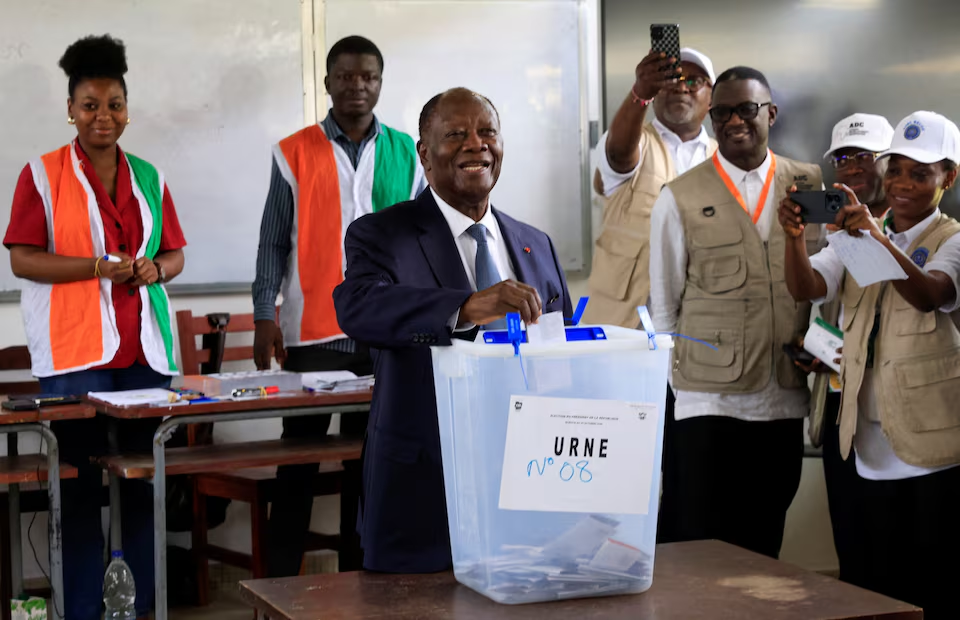News
Ivory Coast Votes with Focus on Ouattara’s Legacy and Age

Ivorians went to the polls on Saturday for a presidential election largely seen as a referendum on the legacy of incumbent Alassane Ouattara, 83, who is widely expected to secure another term after nearly 15 years of economic growth and relative stability. Ouattara has hinted this may be his final campaign.
A former international banker and deputy managing director of the International Monetary Fund, Ouattara first came to power in 2011 following a four-month civil war that claimed around 3,000 lives, sparked when then-president Laurent Gbagbo refused to concede defeat in the 2010 election.
More than eight million voters are registered, and polling stations were set to close at 6 p.m. local time (1800 GMT). Provisional results are expected within five days. If no candidate wins more than 50% of the vote, a runoff will be held.
Succession in the Spotlight
Gbagbo and former Credit Suisse CEO Tidjane Thiam were ruled ineligible to run this year, leaving Ouattara with no major rivals, as other opposition candidates lack significant party backing.
Announcing his candidacy in July, Ouattara described a fourth term as part of a “generational transition.” Earlier this week, he acknowledged that, at 80, “it’s not easy to work at the same pace.” The median age in Ivory Coast is just 18.
As polling stations opened at 8 a.m. GMT in the Adjamé district of the commercial capital Abidjan, even some of Ouattara’s supporters admitted his time in politics may be nearing an end.
“He has truly changed Ivory Coast’s image, but this should be his last term,” said Soumane Cissé, a 44-year-old driver. “It’s time to pass the torch to a new generation.”
Fatu Fofana, a 48-year-old schoolteacher, agreed that the country needs younger leadership — but only through a peaceful transition. “It has to happen at the right time,” she said. “We need stability.”
Young Ivorians Express Doubt
The world’s largest cocoa producer remains one of West Africa’s fastest-growing economies, and its international bonds are among the continent’s best performers.
Ouattara has sought to diversify economic output beyond cocoa by promoting mining and investing in schools and infrastructure to attract private investment.
Not everyone is convinced.
“I lost my job at the port three years ago and haven’t found another one,” said Alfred N’Zi, 36, voting in Bingerville, an Abidjan suburb. “I didn’t plan to vote, but I came to vote for change. I want things to be different.” He declined to say which opposition candidate he supported.
Landry Ka, a 22-year-old student, said many young Ivorians are “tired of seeing old men making decisions for our generation.” He said he was backing Simone Gbagbo, the 76-year-old former first lady and Ouattara’s strongest challenger.
The youngest candidate in the race, former commerce minister Jean-Louis Billon, is 60. He failed to secure the endorsement of the main opposition PDCI, led by 63-year-old Thiam.
“Many young Ivorians express deep skepticism toward the political elite, citing persistent unemployment, inequality, and a lack of representation,” said Chukwuemeka Eze, director of the Democratic Futures in Africa program at Open Society Foundations.
Arrests and Tight Security Ahead of Vote
While Ivory Coast has a history of election-related unrest, this year’s campaign has been mostly calm, aside from sporadic protests in several cities, including the political capital, Yamoussoukro, where authorities imposed a curfew on Friday night.
The government deployed 44,000 security personnel nationwide, and Amnesty International said authorities had imposed excessive restrictions on demonstrations.
Hundreds of people have been arrested, and the Interior Ministry said dozens received prison sentences of up to three years for offenses such as disturbing public order.
Government spokesperson and former prime minister Patrick Achi told Reuters that while the administration protects free speech, it remains determined to preserve order.
“Let’s maintain stability,” he said. “Future generations will benefit — but at least the economy, after everything it has endured, won’t be destroyed again.”
